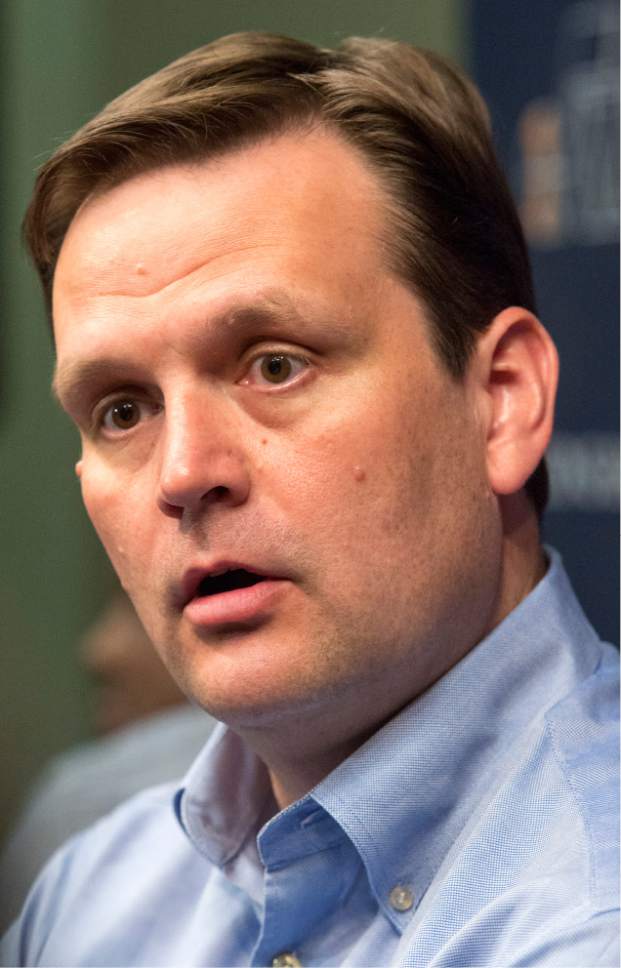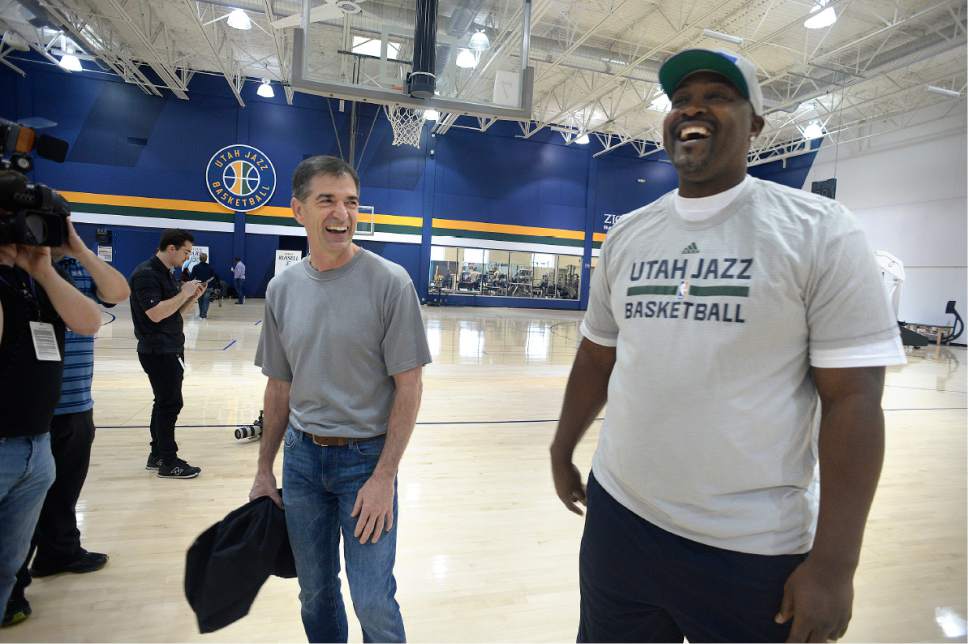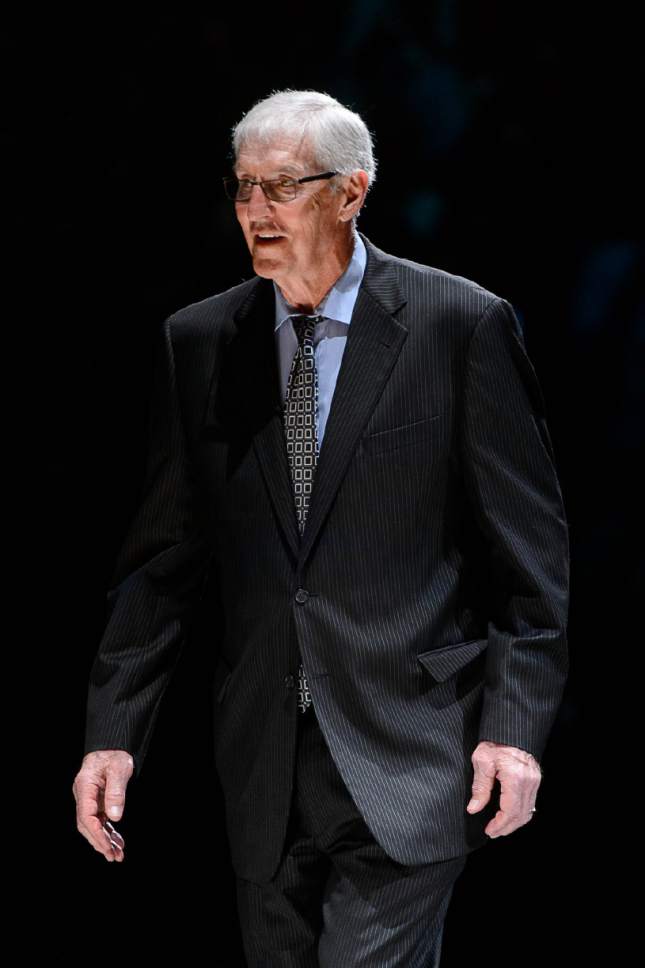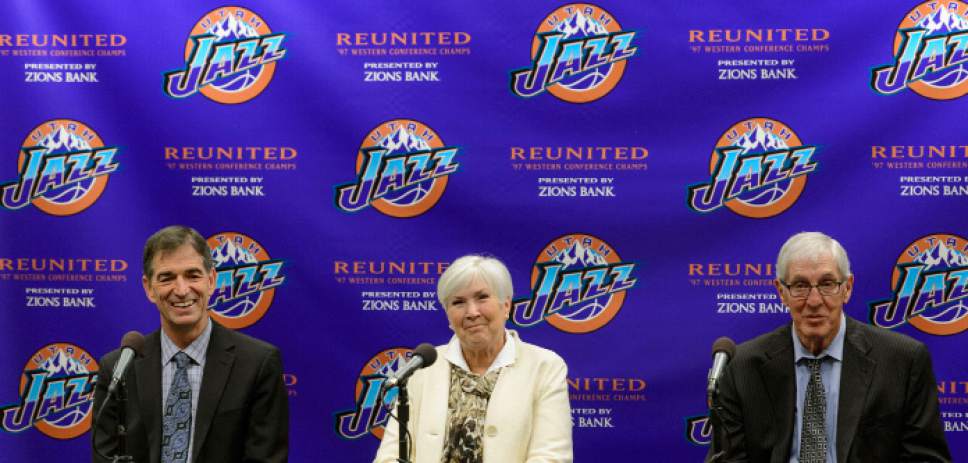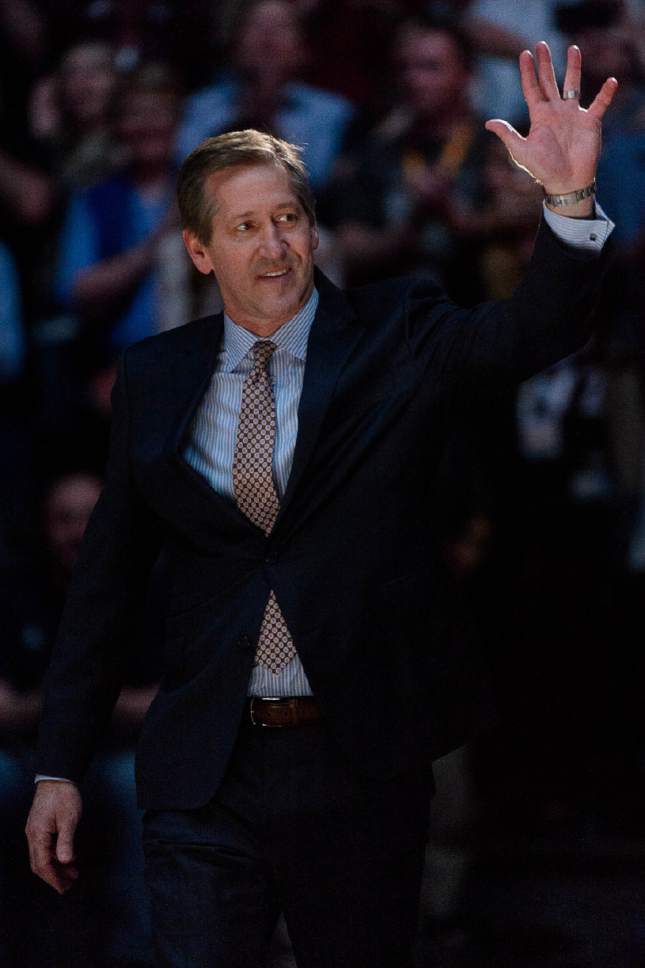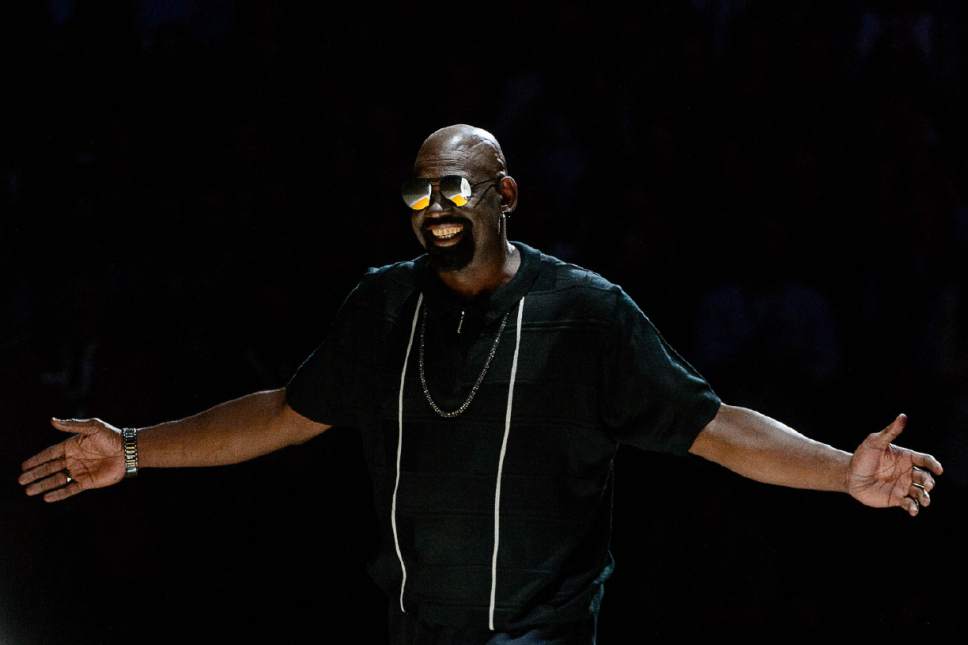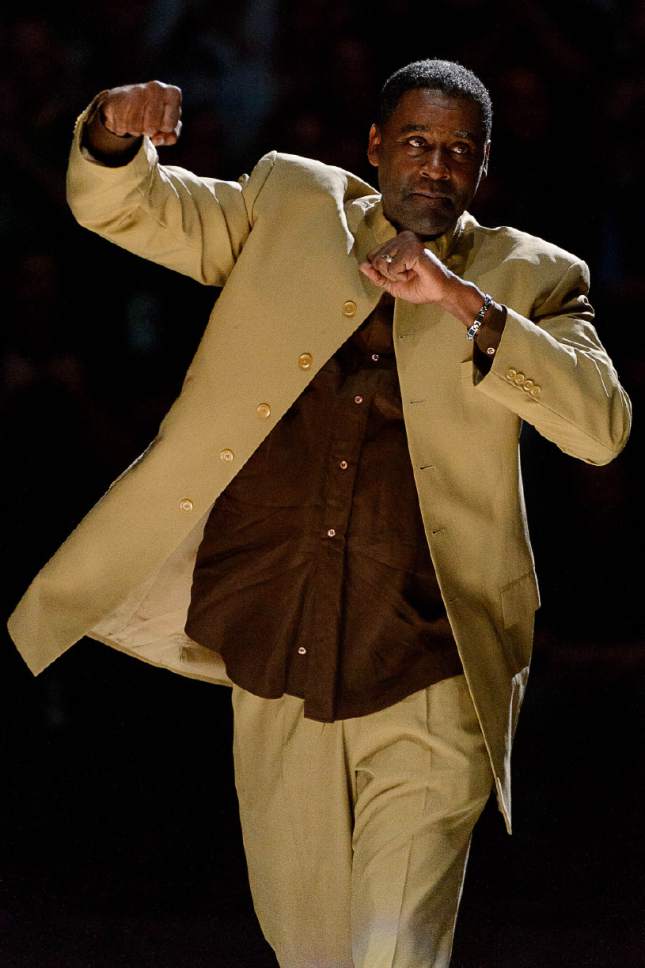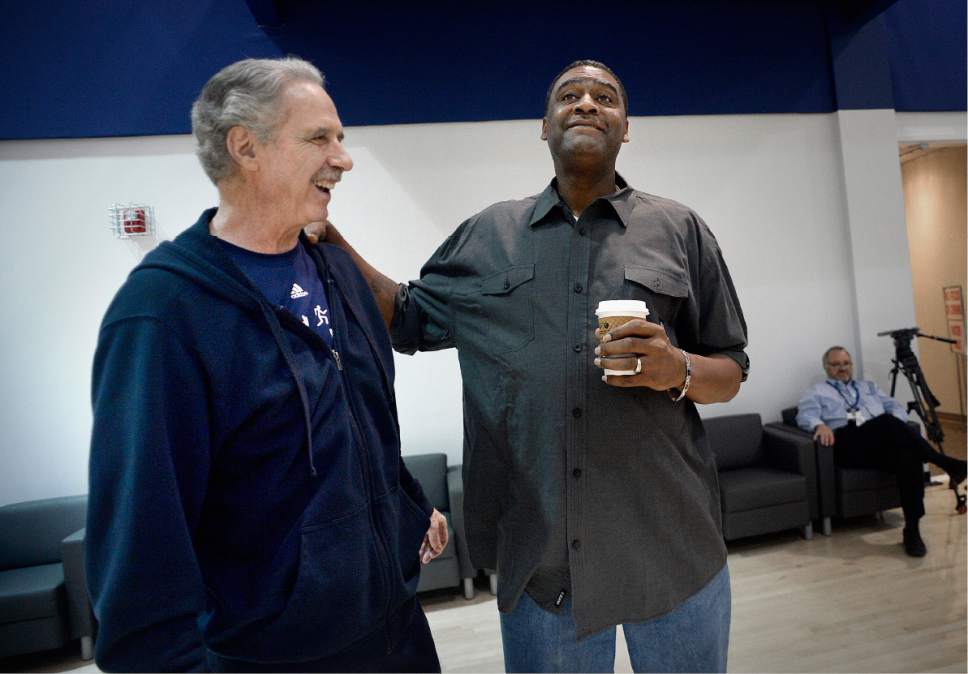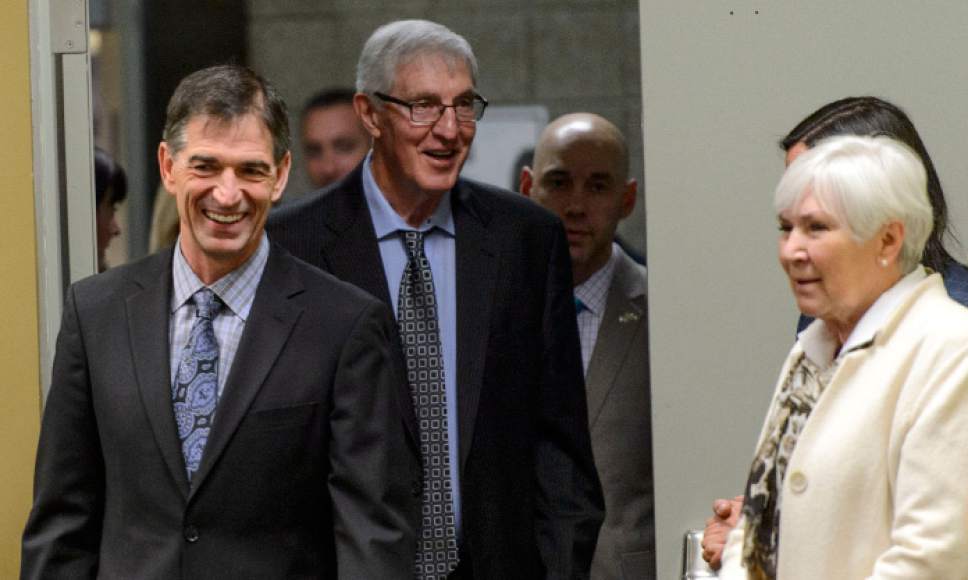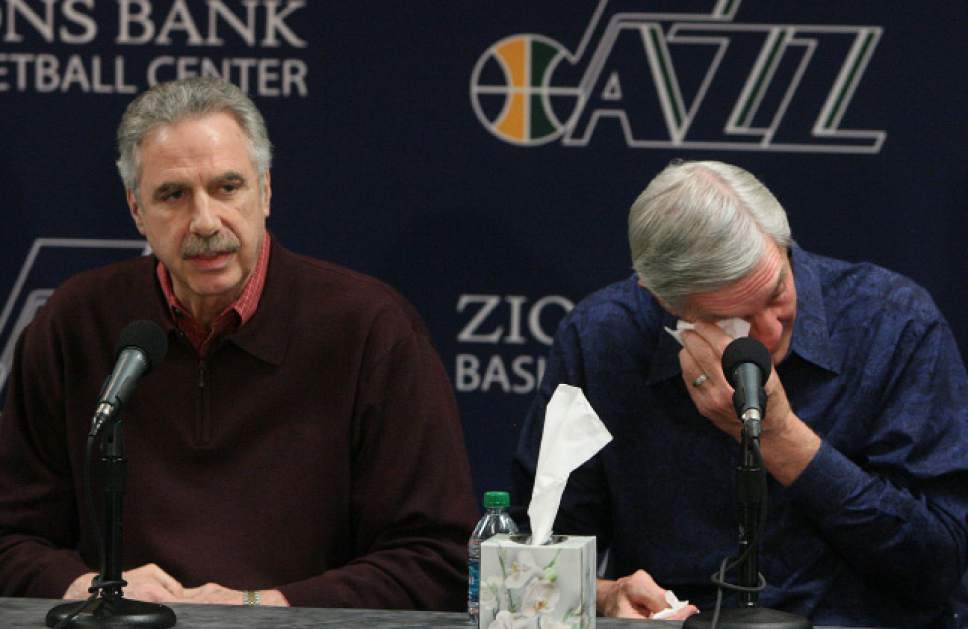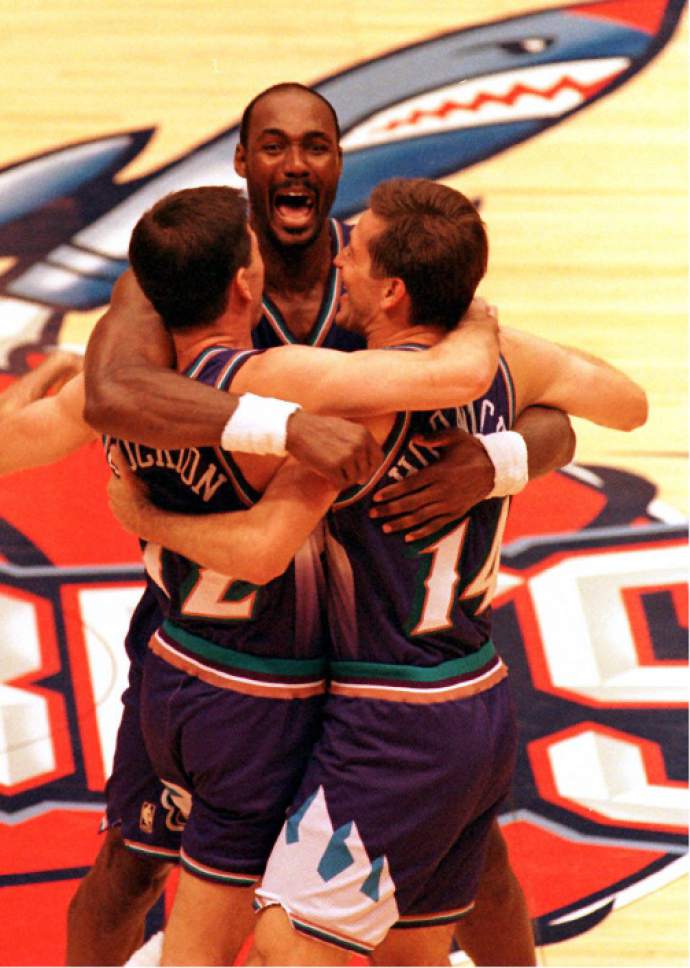This is an archived article that was published on sltrib.com in 2017, and information in the article may be outdated. It is provided only for personal research purposes and may not be reprinted.
There was Bill Walton's "Uh oh."
There was Hot Rod Hundley's "Unbelievable!"
But for the man at the center of it all, the biggest moment in Utah Jazz history had been a blur.
"Who knows?" John Stockton said to NBC sideline reporter Jim Gray, when asked to describe his buzzer-beater minutes after he'd finished off the Houston Rockets in Game 6 of the 1997 Western Conference Finals. "I'm just glad it went in."
After collecting himself in the visitor's locker room in the bowels of the Summit in Houston, Stockton had only a few more answers for the press.
''It's all a fog to me,'' he said. ''I was free for a second, and I just let it go. No one cares who the hero is when you win. Sometimes the hero is the guy who sets the screen or throws the inbounds pass. What word did Charles [Barkley] use the other night? Surreal? Well, I don't know what it means, so I won't use it tonight.''
Here's the reality: Twenty years ago, the Jazz won a franchise-best 64 games that season. Karl Malone was named MVP of the league. But the 3-pointer that sent the Utah Jazz to the NBA Finals remains the most iconic moment of that season and the proudest moment in the history of the team.
There was Bryon Russell with the ball in his hands. Antoine Carr diving to the basket. Jeff Hornacek streaking up the sideline. Karl Malone wrapping up Clyde Drexler.
And there was Stockton, curling up toward the logo at center court, then back toward the hoop, pulling up and firing.
"The shot that got us to the Finals," Stockton says now, "is what sticks out in everybody's mind."
Two decades later, the point guard, his teammates, coaches and other onlookers can paint a much more vivid picture.
This is how they remember it.
PART I: UTAH JAZZ BASKETBALL
The Utah Jazz were on the precipice of a breakthrough on the night of May 29, 1997. They also were dangerously close to backsliding into heartbreakingly familiar territory.
After a 96-91 win over the Rockets at the Delta Center two nights earlier, the Jazz held a 3-2 lead over Houston in the series, with a chance to close out things at the Summit.
But after Clyde Drexler's personal 8-0 run in the fourth quarter and a 3-point basket by Jazz killer Eddie Johnson, Utah trailed by 13 with under seven minutes to play.
Doubt crept over a fan base. The Jazz were 1-11 on the road in conference finals games before that night. And thrice before they had made it to the conference finals only to come up short, losing to Portland in 1992, Houston in 1994 and Seattle in 1996.
The Jazz weren't going to let it happen again.
JOHN STOCKTON, point guard: "I think the first time I've seen a highlight of anything other than the shot was [in late March]. Somebody showed me the last few minutes, and you see the contributions and the things that led into it. Bryon Russell's 3-point shots, Oster blocking shots all over the place, everybody was contributing. So much fun. And the shot just culminated the whole deal and got us where we all had dreamt of being."
GREG OSTERTAG, center: "Basketball's a game of momentum. We were down 12 or 13 and momentum started to swing."
GORDON CHIESA, assistant coach: "The special part about it is the unbelievable stick-to-itiveness of John and Karl and Jeff. It sounds like such an old-school thought, but the ability to keep going at it full force, to give your best every single day; that was Jazz basketball."
OSTERTAG: "It's hard to not think you're still in the game when you have those guys on your team."
PHIL JOHNSON, assistant coach: "John had an unbelievable fourth quarter. … He really turned it on. He didn't do that a lot during his career. Most of the time it was getting other people involved, then hitting big shots at the end of quarters."
STOCKTON: "I think you just keep playing. You never give up. You see people's shoulders slumped and that's it. I don't think anybody's shoulders slumped even though we were down big at the end of the game. The rest is history."
PART II: THE SHOT
The Jazz's Hall of Fame point guard was incredible that night.
"John Stockton is one of the five best players I've ever played against," Rockets forward Charles Barkley said after the game. "He's tough as nails."
Toward the end of their late rally, Stockton and Malone went two-on-three in a fast break, and the crafty point guard scooped in a right-handed layup from the left side of the paint to cut the lead to two. Stockton went right at backup guard Sedale Threatt for the tying bucket the next trip down the court.
Stockton would score 15 of his 25 points in the fourth quarter, 13 in the final 3:13. But the Jazz would need a little luck to get those final 3.
Houston had the ball with 22.4 seconds on the clock and the game tied at 100. The Rockets let Drexler go one-on-one with Russell, but his off-balance leaner missed and Malone rebounded and called timeout. The clock showed 2.8 seconds.
The Jazz broke from their huddle and lined up in a picket fence formation above the free-throw line.
JOHNSON: "It was a play we'd run forever here. We didn't always run it for John, though. We'd run it for different people. It was called straight line."
CHIESA: "Bryon Russell is inbounding and there's so much pressure on him. He's counting in his mind, 'One thousand one, one thousand two' and three-and-a-half, you have to throw it."
DENNIS LINDSEY, Rockets video coordinator: "The proper technique in screening situations is to have the defender as tight to the screener as possible. In this case we came out and the defender that was guarding Karl, there was a space in between. [Future Jazz assistant coach] Mike Wells and I were back in the video room, coming out of the timeout. Literally I'm jumping up and down screaming and start to run down the hallway to the court because we're not up on the screener."
STOCKTON: "As with any play, there are 1,550 variables that can take place. I remember the play. We ran it often. This was a little bit different."
CHRIS MORRIS, forward: "We knew we had to get a shot up, and the best player to get one is our leader that runs the team in game situations. It was him. He doesn't force a lot of shots. Who else to take one that was the biggest shot of anybody's career?"
STOCKTON: "I just remember as I started to curl, it felt like the whole Houston Rockets team was waiting over there for me just to curl right into them. I knew that wasn't going to work."
ANTOINE CARR, forward: "Everybody knows John is a great player. We know he's going to hit home some of those astronomical shots that no one else can, except him and Hornacek."
STOCKTON: "Bryon Russell read my cut perfectly. Karl set a thunderous screen over there."
HOWARD EISLEY, point guard: "Karl set an unbelievable, legal screen."
CHIESA: "They loose-switched it. Drexler and Barkley. They loose-switched it, and that made Barkley guard John."
JOHNSON: "He just came off it and Barkley really didn't switch out. Teams didn't switch as much then as they do now. He needed to be switching out. He got there, but he was a little late."
STOCKTON: "There was a lot of territory there. I even had a chance to take a dribble and size it up."
CHIESA: "John made it, but I call it a team shot. It was Karl setting the screen for him. It was Jeff Hornacek being an elite decoy and Bryon Russell with poise under fire to inbound the ball."
JEFF HORNACEK, shooting guard: "That was John's shot all the way."
STOCKTON: "I guess you grow up, you're out there on the court by yourself, you're always saying '3 … 2 … 1 …' like you see in the movies. I'd probably shot that shot a hundred times in my head, maybe a thousand as a kid. You don't really think about it at the time. … It's quiet. Whatever it is. I'm sure the arena wasn't. But it was quiet."
EISLEY: "I know he's made that shot a million times … so I'll take my chances with him shooting that shot."
HORNACEK: "From where I was when John lined up the shot, I was kind of on that angle where I saw the trajectory. I saw where it was going. I could tell right off the bat. It was right on line. The feeling for us was that we finally got over the hump. We were going to go to the finals."
JOHNSON: "When it left his hands, I knew it. It was crazy. I just thought it was going in. It's unbelievable."
STOCKTON: "All I can think of, and I do remember this, is follow through. Finish the shot. So, that I did. Normally my shot's a little quirky and weird anyway, but that one followed through and snapped through and it found its mark. It was a good day."
LINDSEY: "I'm a good 90 feet down the hall, so I got there right when the scream happened after him making the shot, or the groan, whatever you want to call it. I saw it a bunch on replay."
PART III: JUMP AROUND
As the basketball arced through the air, bound for the hoop, soon to become the biggest shot in franchise history, Gail Miller was trying to grab a bite to eat. The family's matriarch, her late husband, Larry H. Miller, and their grandson, Zane, were making a futile attempt to avoid the stress of watching Game 6 of the 1997 Western Conference finals. So they decided to go out for dinner at the Cowboy Grub near Parley's Canyon.
"It was very, very tense. We were trying to divert ourselves from being so intense with those games," she recalls. "… [But] we were waiting in the parking lot for the shot — and it came. I think everyone remembers where they were in that moment."
Greg Ostertag remembers being angry.
The Jazz's starting center could frustrate fans and coaches with his inconsistent play. Not that night, though. He scored 16 points, grabbed 14 rebounds and blocked three shots. But Ostertag was stuck on the bench for the game's final minutes after picking up his sixth foul while trying to swat Barkley near the basket.
"I didn't see the shot go in," he says. "I had my head in a towel. I was bummed that I wasn't in the game because of some ticky-tack foul. I was sitting here and I heard everybody jump up, so I did, too."
GAIL MILLER, owner: "It was kind of unbelievable, as evidenced by [Stockton's] jump."
JERRY SLOAN, coach: "I don't even know what happened after that. I got so excited and excitement wasn't what I was about too much."
OSTERTAG: "I was watching [Stockton, Malone and Hornacek] jumping around. They played so hard and finally got a chance to go to the finals. And I was watching Jerry jump around. He wasn't one to ever show a lot of emotion."
STOCKTON: "Coach's knees looked pretty good. When that shot went in, [he] was bouncing up and down pretty good on that court."
SLOAN: "That's all the bouncing I could do."
STEVE LUHM, Salt Lake Tribune reporter: "I remember how quiet the arena got. It went from everyone going crazy to silence. You could hear the Jazz players yelling and celebrating."
STEPHEN HOWARD, small forward: "Once he hit that, it was just jubilation."
HORNACEK: "We were working our tails off the years prior to that, trying to get there. Not just for the guys, but for the coaches, for the city of Salt Lake, and the state of Utah."
STOCKTON: "We exorcised some demons when we beat Houston down there. Houston had beaten us in the playoffs a number of times on last-second shots or whatever. Or Portland. … They had beaten us. Phoenix, Charles had beaten us. We exorcised our own demons and we got over a couple huge, huge hurdles that had eluded us before."
PART IV: SILENCE, CELEBRATION
His teammates called him the "silent assassin" because on bus rides he would listen in to their conversations then fire off a one-liner that would double over his teammates. But on the bus ride to the airport in Houston, Stockton had to be urged to speak. Forward Adam Keefe convinced the point guard that the moment was big enough to break the team rule banning cellphones on the bus. Stockton called home to his wife. She told him the city had erupted in celebration.
When they arrived in Salt Lake City, there would be an estimated 15,000 fans waiting for them at the airport.
CHIESA: "There was almost like a quietness. We didn't really celebrate on the bus or the plane. It took so much energy out of us to win the game."
STOCKTON: "It's certainly relief at first, and joy. I don't know if you could separate the two at the time. But it's so short lived. What is it? A minute? Is it an hour? Is it 25 minutes? After that game, we're sitting there going, 'OK, what's next?' And we knew what was next."
CHIESA: "Imagine a world without cellphones, without Instagram. Two hours after John makes the shot, I see him walking down the aisle and I showed it to him. I had my portable Panasonic VCR with me. He said, 'Gordy, that's the first time I've seen it.'"
MORRIS: "When we landed, it was awesome. We came home as the Western Conference champs."
OSTERTAG: "I remember going through the gate and these three guys were like, 'We're from St. George!' I was like, 'God, they really drove up?' That was one of the cool things for me, just to get off the plane and see all these people who had been waiting for the franchise to do something like this since they got here."
CHIESA: "It was incredible. It was like a parade. I remember driving home and people were outside hitting pots and pans and celebrating. I remember having a shot of whiskey with my next door neighbor at 5 a.m. I never drink whiskey ever."
LINDSEY: "It kept me up many nights thinking about, wondering what if. … But what makes you cry, eventually you've got to laugh. I'm at that stage."
MORRIS: "I've lived in Houston for years. They haven't been the same since."
STOCKTON: "We're not the champs, but we're pretty proud of what we accomplished."
Lynn Worthy contributed to this story.
Twitter: @aaron falk —
'97 Western Conference Finals
Game 6 by the Numbers
33 • Game-high points for Houston's Clyde Drexler
24 • Points for league MVP Karl Malone
15 • Fourth-quarter points from John Stockton
14 • Rebounds for center Greg Ostertag
13 • Jazz deficit with under seven minutes to play
5 • Total bench points for Utah
2.8 • Seconds on the clock for final play


